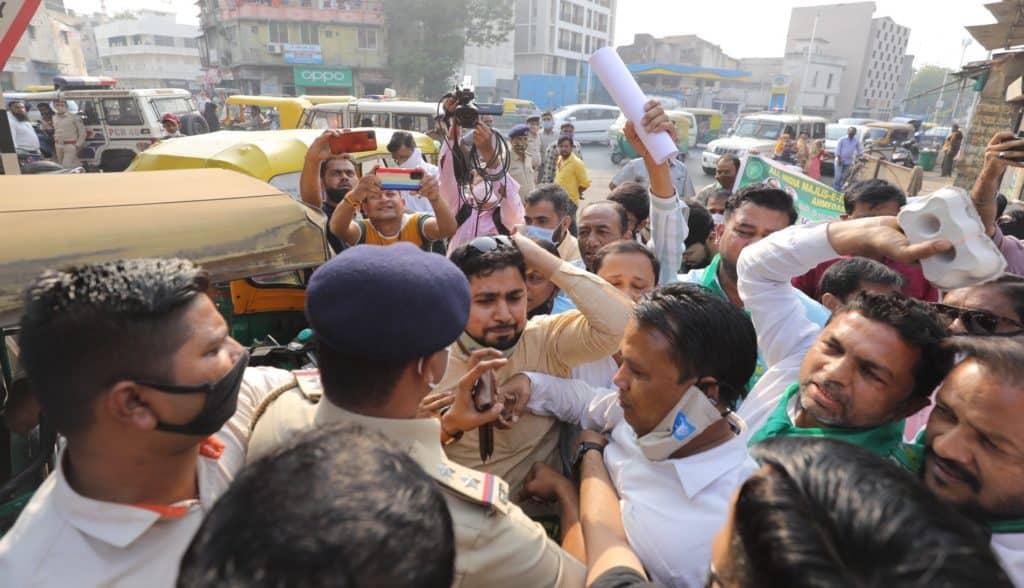The orders were verbal, with no paper trail. Curiously, the Ahmedabad Municipal Corporation was the last to implement it. In one fell swoop, four BJP-controlled municipal corporations directed their executive wings to launch a drive to remove Ahmedabad’s street vendors selling eggs and other non-vegetarian eatables at roadside stalls.
One reason given for these verbal orders was that the sight of non-veg food displayed in the stalls hurts the religious sentiments of the Hindus. The drive to remove all such street vendors from the streets began from Rajkot on November 9th. Vadodara was next, followed immediately by Bhavnagar and Junagadh. The last to join was the Ahmedabad Municipal Corporation.
Afterthoughts
In the days immediately after the drive began, two more reasons were added: That the smoke and smell emanating from these non-veg food kiosks were a health hazard and that they create traffic snarls by encroaching on the roads. It did not take long for this drive to spark a controversy that made headlines in national media.
Read more: “Street vendors are claimants, not intruders”
In a delayed response, Chief Minister Bhupendra Patel at an event in Anand clarified that the state government had no role in this and that this was the decision of the municipal corporations.
“The government could not have any objections to people’s food choices,” said Patel. “People should ensure that they ate hygienic food, veg or non-veg can’t be an issue.”
Patel, however, added that if such stalls were an encroachment and creating traffic issues, the municipal corporations could in their wisdom remove them.
Ditto the powerful Gujarat BJP president CR Paatil, who said a week ago: “We are not targeting anybody for selling eggs or non-veg food. It is the people’s choice. The municipal corporations have been told this. They may have removed some street vendors’ stalls for encroachment, but not for what they sell.”
SC orders violated
The ruling party may have defused this particular controversy, at least for now. But the drive did revive the larger issue of the right to livelihood of these street vendors. There are an estimated 15 lakh of them in Gujarat with the maximum in Surat, 1.5 lakh, and around 1.25 lakh in Ahmedabad.
The municipal corporations, whose new bodies were elected this February, launched this drive without any advance notice or warning. The street vendors had just begun regaining their livelihoods after the devastation caused by the COVID-19 crisis and the extended phases of lockdown, when they were hit by this eviction drive.
Union leaders of street vendors say that a staggering 50,000 of them shut shop out of fear as removal cranes arrived to demolish other shops.
“Veg or non-veg comes later,” said Vadodara-based environmentalist and human rights activist Rohit Prajapati. “The point is under which legal provision they took this action. None. Supreme Court’s directives and the Street Vendors Act, 2014, are very clear. This can’t be done without providing them with alternative arrangements.”
Read more: Chandigarh: Resettled vendors rue lack of business and facilities in new vending zones
The eviction drive may have been temporarily halted. But the vendors are fighting back. On November 25th, they moved a petition in the Gujarat High Court against the seizure of their handcarts by the municipal corporations. The petition pointed out that “thousands of handcarts were confiscated without any rhyme or reason throughout the state and no due process was followed.”
The petition has also emphasised the non-implementation of the Street Vendors (Protection of Livelihood and Regulation of Street Vending) Act, 2014, in Gujarat.
“Selling non-vegetarian food on the streets does not impinge upon anybody’s rights. A vegetarian might find consumption of non-vegetarian food offensive whereas a vegan might find consumption of milk, cheese and honey as offensive,” the petition argued. “As long as a person doesn’t violate any law, he/she must be free to sell anything under the right to livelihood guaranteed by Article 21 of the Constitution”, it stated.
Committees on paper
Under the Street Vendors (Protection of Livelihood and Regulation of Street Vending) Act, 2014, a 19-member Town Vending Committee has to be constituted by all municipal corporations with good representation of vendors. This committee is required to conduct a survey and identify hawking and no-hawking zones. Such a survey is being launched in Delhi, for instance.
The committee also has to ensure that vendors are given an alternative place within two km of their present location, so that they don’t have to look for new business in a faraway area.
When contacted, Rakesh Maheria, president of the Laari-Galla Patharna (street vendors) Sangh Gujarat also pointed out that “the Supreme Court had in 2009 ordered that no street vendors could be removed in the name of encroachments without providing them concrete alternative arrangements. But the municipal authorities just ignore this.”
He says town vending committees constituted by municipal corporations in Gujarat exist only on paper. “Where are the surveys and where are the hawking zones with all facilities?” asks Rakesh. “The main reason Gujarat’s civic bodies are not earmarking land parcels to create hawking zones is that many such spaces are in commercially prime areas dominated by Hindus,” he asserted.
This despite a central order of May 18th this year from the Union Ministry of Housing and Urban Affairs to chief secretaries of all states, asking them to provide vending certificates to all street vendors and not harass them. “Only 42,000 from the 1.25 lakh hawkers in Ahmedabad have been given these certificates so far,” said Rakesh. “And in the case of non-veg food vendors, only 4% out of an estimated 4,000 of them have such certificates.”
